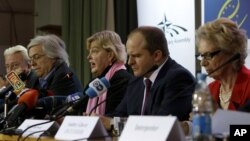Ukraine's ruling party is facing criticism at home and abroad, even as it appears on course to maintain its majority after Sunday's parliamentary elections.
Jailed opposition leader Yulia Tymoshenko announced Monday she is launching a hunger strike to protest the vote. With about 70 percent of the votes counted, her pro-Western Fatherland Party trails President Viktor Yanukovych's ruling Party of Regions, 34 to 23 percent.
Tymoshenko's lawyer, Serhiy Vlasenko, read her statement to the press.
"If I were with you now and had an opportunity to act freely, I would without doubt call on you to stage an indefinite civil disobedience action, and we together would show these forgers their place, as we've done many times in the past. But now, being behind bars, I cannot call on you to come out to the square because I cannot guarantee that such gatherings will be peaceful and well-organized, so I do all I can do under such circumstances: I declare a hunger strike to protest against fake elections and an illegitimate parliament," he read.
Election observers from the Organization for Security and Cooperation in Europe chastised authorities in Ukraine for their handling of the elections. OSCE mission coordinator Walburga Habsburg Douglas said Sunday's vote constituted "a step backwards," in some ways.
"Considering the abuse of power and an excessive role of money in this election, democratic progress appears to have reversed in Ukraine," she said.
Douglas put much of the blame on the ruling party, which she said used state funds to finance its campaign activities while also controlling the flow of information.
"I do not think that voters should face harassment or intimidation from employers or the government. And one should not have to go to a prison to hear from leading political figures in this country," she said.
The United States characterized Ukraine's elections in similar terms. A the State Department spokesman, Mark Toner, said that while Ukraine's elections were peaceful overall, the U.S. is concerned about reports of fraud and falsification of votes. Toner added that the United States shares OSCE's concerns about the government favoring ruling-party candidates and harassing opposition candidates.
In Kyiv, Prime Minister Mykola Azarov dismissed the criticism. "We already know statements from the whole range of election observation missions. Every single one of them is positive. And we hope that as a whole, all those international observers will finish their work with such a positive conclusion," he said.
Initial results indicate the Communist Party of Ukraine, Yanukovych's parliamentary ally, finished in third place with about 15 percent of the votes.
Earlier Monday, Vice Prime Minister Sergei Tigipko said he was pleased with the outcome.
"We are satisfied with the results the Party of Regions has received. It's the best result for a ruling party in over 20 years. I think an even more convincing victory will come after all the votes are counted, and the total will give us the chance to become the majority party and continue the reforms we have started," he said.
Victory for the ruling party will likely cement Yanukovych's leadership status. He is midway through a five-year presidency, marked by an accumulation of presidential powers and antagonism with the West.
Still, the initial results show some newer opposition parties making some gains, including the pro-Western UDAR, or Punch, party, led by world heavyweight boxing champion Vitaly Klitschko. Punch drew about 13 percent of the vote, but even Klitschko is uncertain how much impact his party will have.
"According to the results, opposition forces have gained more then 50 percent. Some suggest 55-57 percent. I'm sure that if not for the new election laws, we could form the majority, impeach today's government and form a coalition government. Also, in the shortest possible time we could decriminalize the law for which the leader of the Fatherland, Yulia Tymoshenko, and Yuri Lutsenko are jailed. But today, new laws on individual races possess a real threat because manipulation is possible, and it is taking place," he said.
The nationalist Svoboda - Freedom - Party appeared to have won nearly 9 percent of the vote.
The elections for the 450-seat unicameral parliament, the Verkhovna Rada, were a huge test for Ukraine's fragile democracy, already overshadowed by the imprisonment of Tymoshenko, who has spent more than a year in prison for abuse of power while in office. She is serving a seven-year sentence.
Voters cast ballots to select party lists to fill half of the parliament seats; the other 225 seats were filled by individual races in geographic constituencies.









